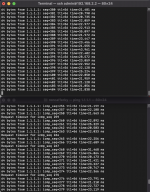Hello,
My router is set up to route all of my clients over VPN. However it appears that my mac clients, specifically my iMac, randomly will drop packets while on the VPN. When I turn off the vpn on my router, there is no packet loss.
I tested other clients, and the first screenshot of terminal you see is a linux box that does not have any packet loss while on the VPN.
I had this issue on older versions of MaxOSC as well. Right now, i am on Big Sur version 11.2.1.
I have tested both Wifi and Ethernet interfaces and it appears to behave the same way.
I've tried playing around with the MTU settings. I have symmetrical fiber and MTU default is 1500. Nothing really changed when I set the MTU to smaller settings.
I also had this issue on my laptop (Macbook pro) over wifi and ethernet. It seems to be isolated to only macs..
Any ideas on what else the issue could be? Thank you.
-Ron
My router is set up to route all of my clients over VPN. However it appears that my mac clients, specifically my iMac, randomly will drop packets while on the VPN. When I turn off the vpn on my router, there is no packet loss.
I tested other clients, and the first screenshot of terminal you see is a linux box that does not have any packet loss while on the VPN.
I had this issue on older versions of MaxOSC as well. Right now, i am on Big Sur version 11.2.1.
I have tested both Wifi and Ethernet interfaces and it appears to behave the same way.
I've tried playing around with the MTU settings. I have symmetrical fiber and MTU default is 1500. Nothing really changed when I set the MTU to smaller settings.
I also had this issue on my laptop (Macbook pro) over wifi and ethernet. It seems to be isolated to only macs..
Any ideas on what else the issue could be? Thank you.
-Ron





